Step on up: 9 of the best smart scales to help reach your health and wellness goals in 2024
Smart scales do more than just measure your weight. Here, health writer and hiker Susan Griffin reveals all you need to know and the best ones to buy
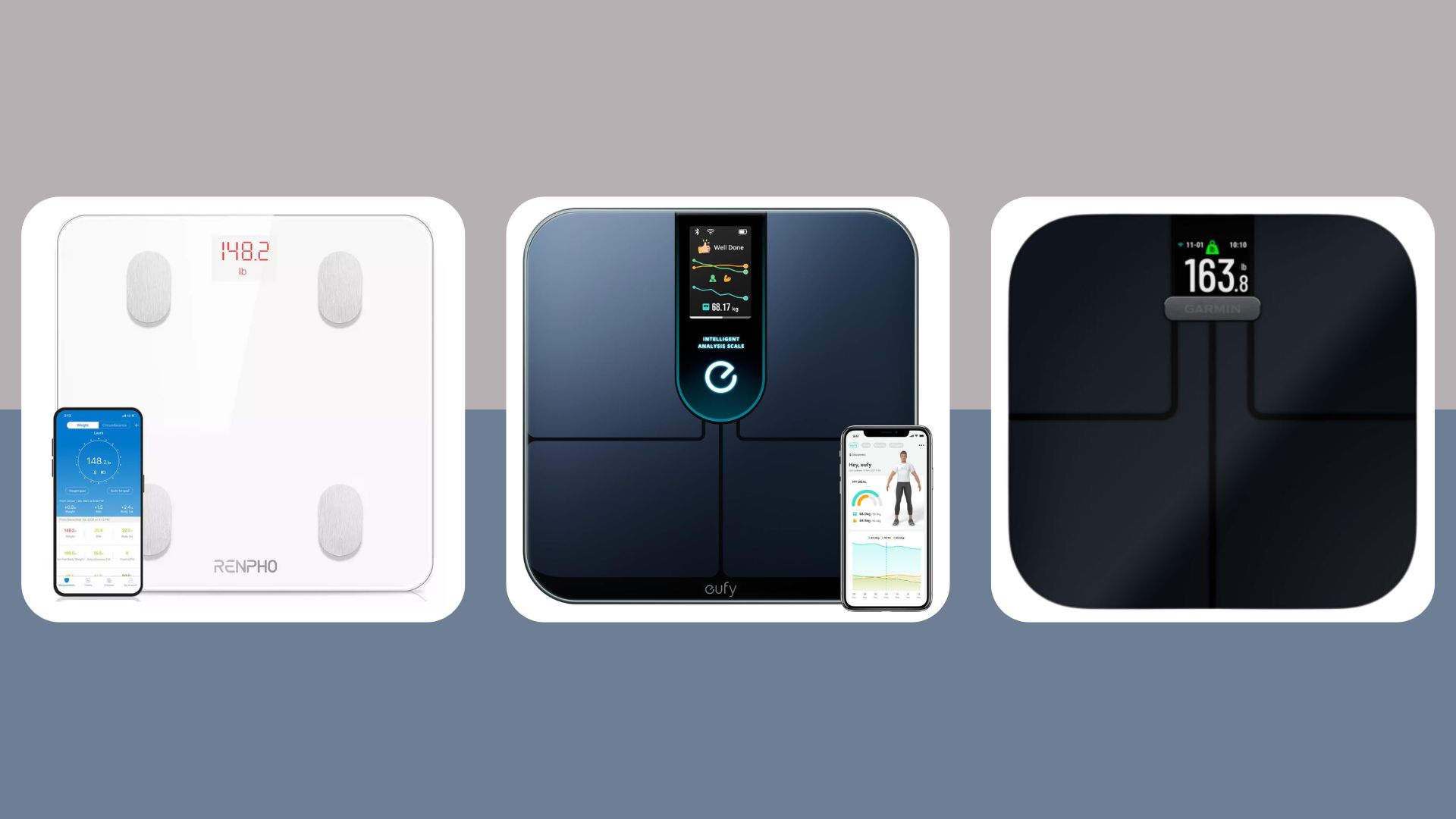
- Top 3 picks
- Best overall
- Best for fitness lovers
- Best versatile scale
- Best budget-friendly scale
- Most advanced
- Best for simple readings
- Best from Garmin
- Best for families
- Best for Fitbit users
- How accurate are smart scales?
- How I tested
- How to choose the right smart scales for you
- When is the best time to use smart scales?
- Are smart scales worth it?

Smart scales claim to analyse everything from muscle mass and bone density to body fat, delivering the results straight to your phone. With new advancements in technology have come new and impressive features but do they really work? And if so, what are the best ones to buy?
Bathroom scales have come a long way. There was a time when your only option was to step on a cumbersome platform and wait for the needle to point towards a number on a dial. More slimline digital scales were then ushered in that showcased your weight in bright lights. Now we have smart scales that sync with apps on your phone and provide a plethora of data to digest, from body fat to muscle mass - much like one of the best fitness trackers.
"The benefit of these scales is that they can provide users with up-to-date information about their weight and health, alerting them to when a heart rate becomes too high or when a BMI is out of a safe range, for example," says Dr Jane Glazebrook, a GP specialising in weight management. "Some people might find their weight plateaus, which can be down to several factors such as increased muscle mass or water retention. Smart scales provide a more detailed picture than just measuring body weight."
As a health and wellbeing writer, I regularly review products, from hiking sandals to walking pads. I'm always keen to try out the latest technology. On a personal note, my clothes have felt a little looser of late but my weight has plateaued. Curious, I've tested several smart scales consistently over the past nine weeks to get a breakdown of what's going on.
Top 3 picks
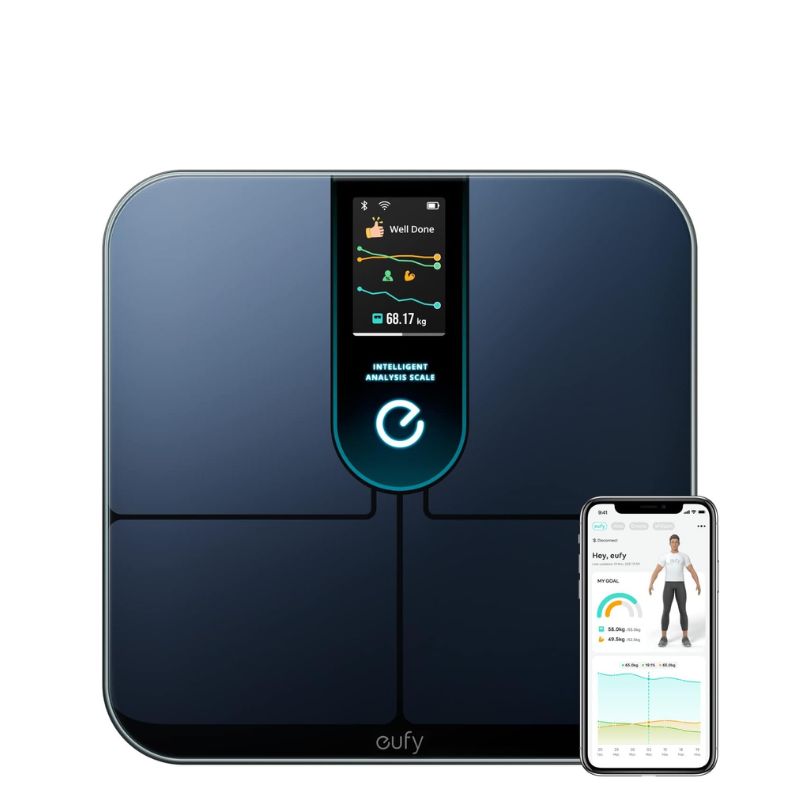
RRP: £79.99
With a simple set-up process, easy-to-use app, extensive metrics, and detailed explanations with insights into health and wellbeing, the Eufy Smart Scale P3 balanced budget with excellent features and usability.
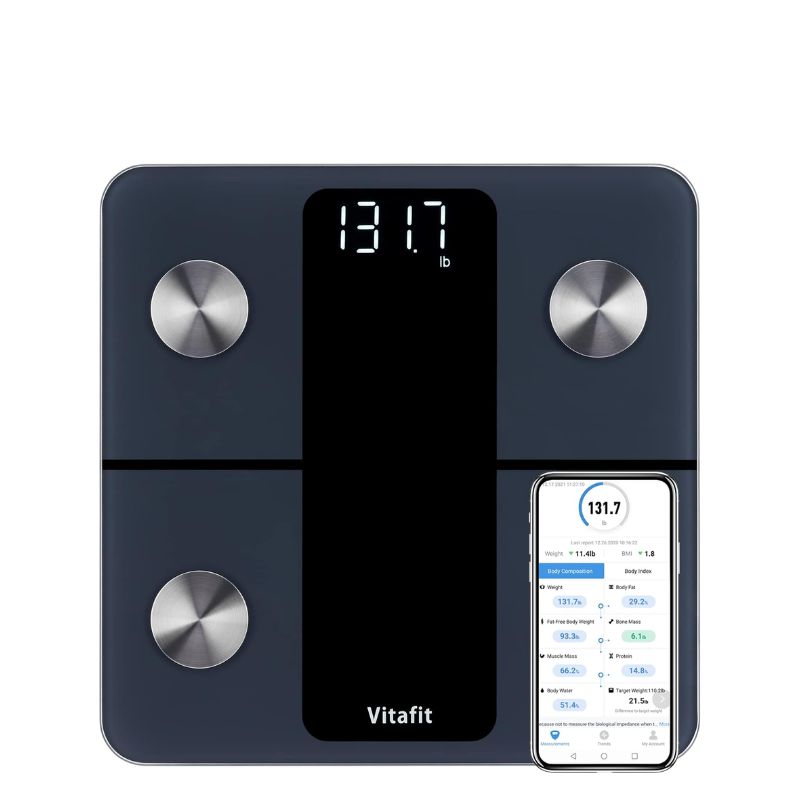
RRP: £35.99
If you're strength training regularly or specifically looking to improve your fitness, the Vitafit scale is a great choice. It has individual 'athlete' and 'general' profiles to personalise your results to your goals, with explanations for the detailed insights available.
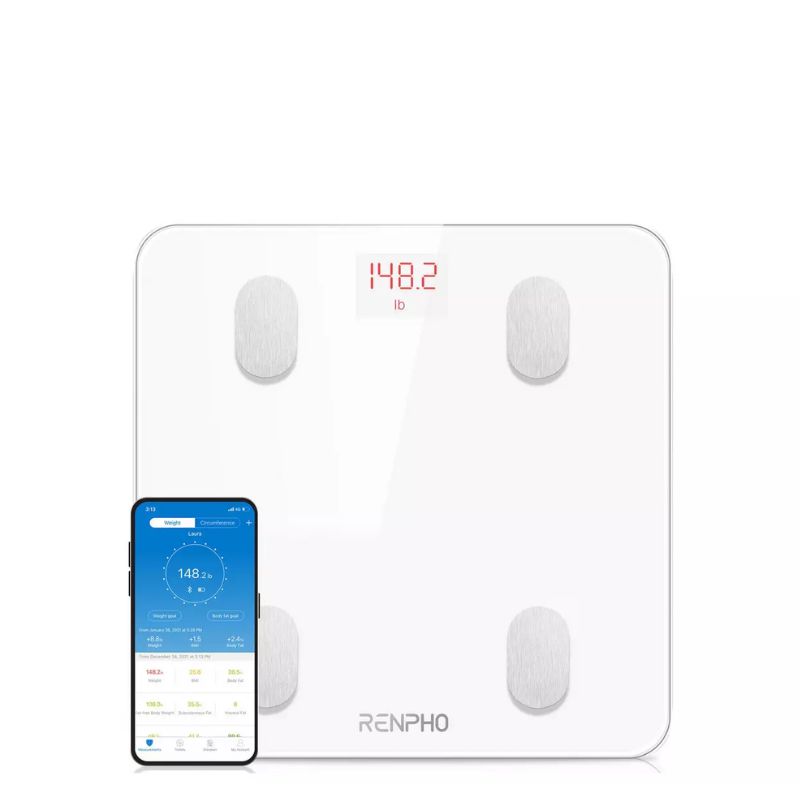
RRP: £25
Looking for a cheap and cheerful smart scale? The Renpho could be for you. The scales come in at less than £30 but offer plenty of measurements, which I found to be very impressive, and use colour coding to clearly display how the results impact your health.
The best smart scales, tried and tested by us
The best smart scale overall
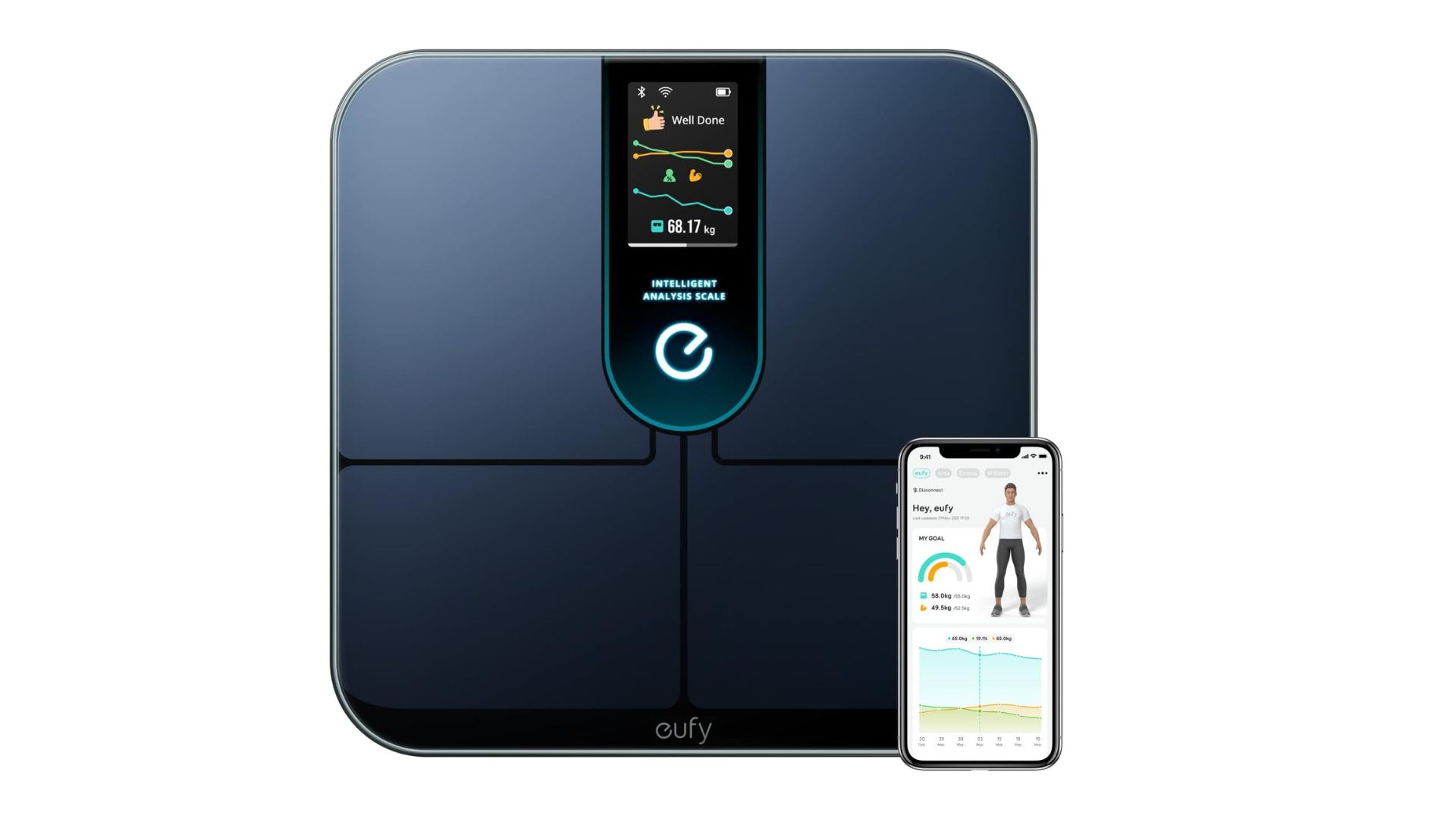
1. Eufy Smart Scale P3
Our expert review:
Specifications
Reasons to buy
Reasons to avoid
Of all the smart scales I tried, the Eufy Smart Scale P3 proved to be a favourite as it ticked so many boxes. For one, it looks smart, has a clear display and the diameter, at over 30 cm squared, makes it a comfortable platform to stand on with plenty of space for your feet.
The set-up was simple but what I really loved about this smart scale on the first try was the app layout. It had plenty of detail, presented in a clear and digestible format, so it didn't overwhelm me. The 16 biometrics include (*deep breath*) weight, BMI, body fat, heart rate, muscle mass, BMR, water, body fat mass, lean body mass, bone mass, visceral fat, protein (low protein mass can be associated with excess body fat), skeletal muscle mass, subcutaneous fat, body age and body type. It's highlighted below each measurement whether the figure is standard or too high, given your age, height, weight, and so on, so you get immediate feedback. In addition, there is a further explanation as to where you should be, why that is, and what you can do to improve your health. I found this motivating as it helped me consider the action I needed to take, rather than telling me my measurement and leaving me high and dry.
Likewise, I found the 3D model of your body that greets you on the homepage to be an inspiring tool as you can compare it to a baseline 3D model of yourself. Some people might think this is gimmicky, but I found it to be a motivating aid to track progression. Overall, these scales provide an impressive level of detail that continues to be appealing - I'm still using it today - and the fact these scales land in the mid-range price point is a big bonus.
Best smart scale for fitness lovers
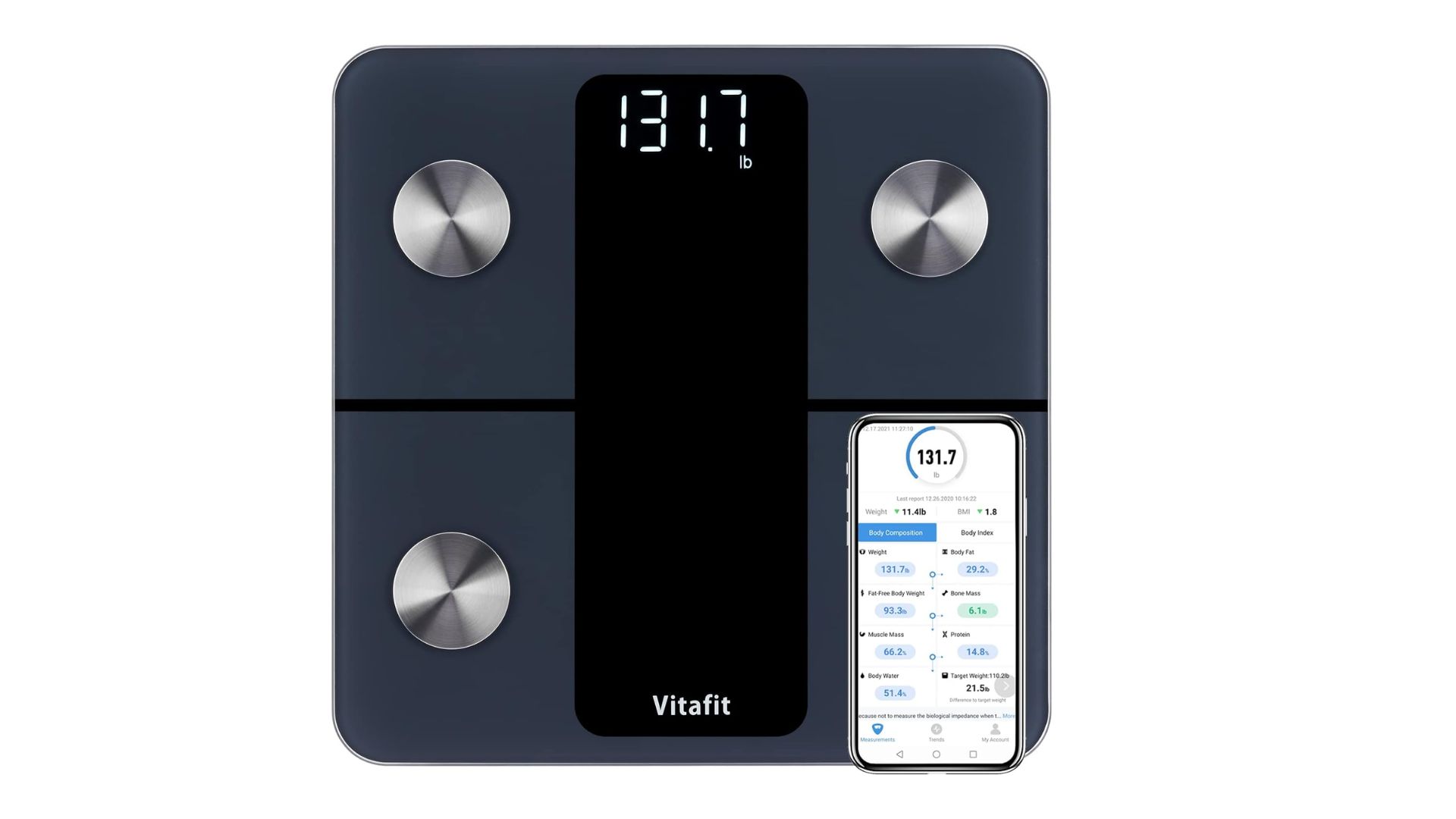
2. Vitafit Smart Body Fat Scale
Our expert review:
Specifications
Reasons to buy
Reasons to avoid
Compared to other smart scales, the Vitafit Smart Body Fat Scale is the better choice for anyone who exercises a lot or is looking to improve their fitness. While the other scales offer plenty of metrics and have multiple profiles for different users, this was the first scale I tested that took specific body types and goals into account.
On the Vitafit app, which you have to download to use the scales, you are prompted to choose a suitable user mode from three options: weight only, athlete, or general. This is particularly important for those who do one of the many types of strength training or just regularly work out as the 'athlete' profile will pay particular attention to muscle mass when working out weight and BMI, etc. That way, you don't end up with incorrect or misleading data because you have more muscle - and muscle weighs more than fat.
You can also use the app to sync data to the Fitbit app and Apple Health, add other users, and set a goal weight, all very useful for those who have health and fitness goals in mind, in my view.
When I picked up the scale, the first thing I noticed was how lightweight it felt. While it's not the lightest scale on the list, it's just shy of being so, making it a great option for anyone who wants to store the scale between uses (although this could affect calibration).
I was impressed by how many stats were available for the accessible price point on this scale too with the data is divided into Measurements breaking the day’s stats into two sections: body composition (weight, body fat, body fat-free, bone mass, muscle mass, protein, body water and target weight) and body index (BMI, visceral fat, subcutaneous fat, skeletal muscle, BMR, metabolic age and height). These appear as different colours to highlight whether results are too high or sufficient compared to standard baselines for your weight, height, age, and so on. There is also a Trends section with graphs, where you can see what progress you are making.
As someone who loves detail and insight into specific metrics on smart scales, this one was another top favourite of mine. When I clicked on each measurement, I could see why it was important to have that specific measurement and I was told where my data sat on a scale. The information is not particularly detailed admittedly, but it offered more than other scales at a higher price point on this list. Overall, I was very impressed.
Best versatile smart scale
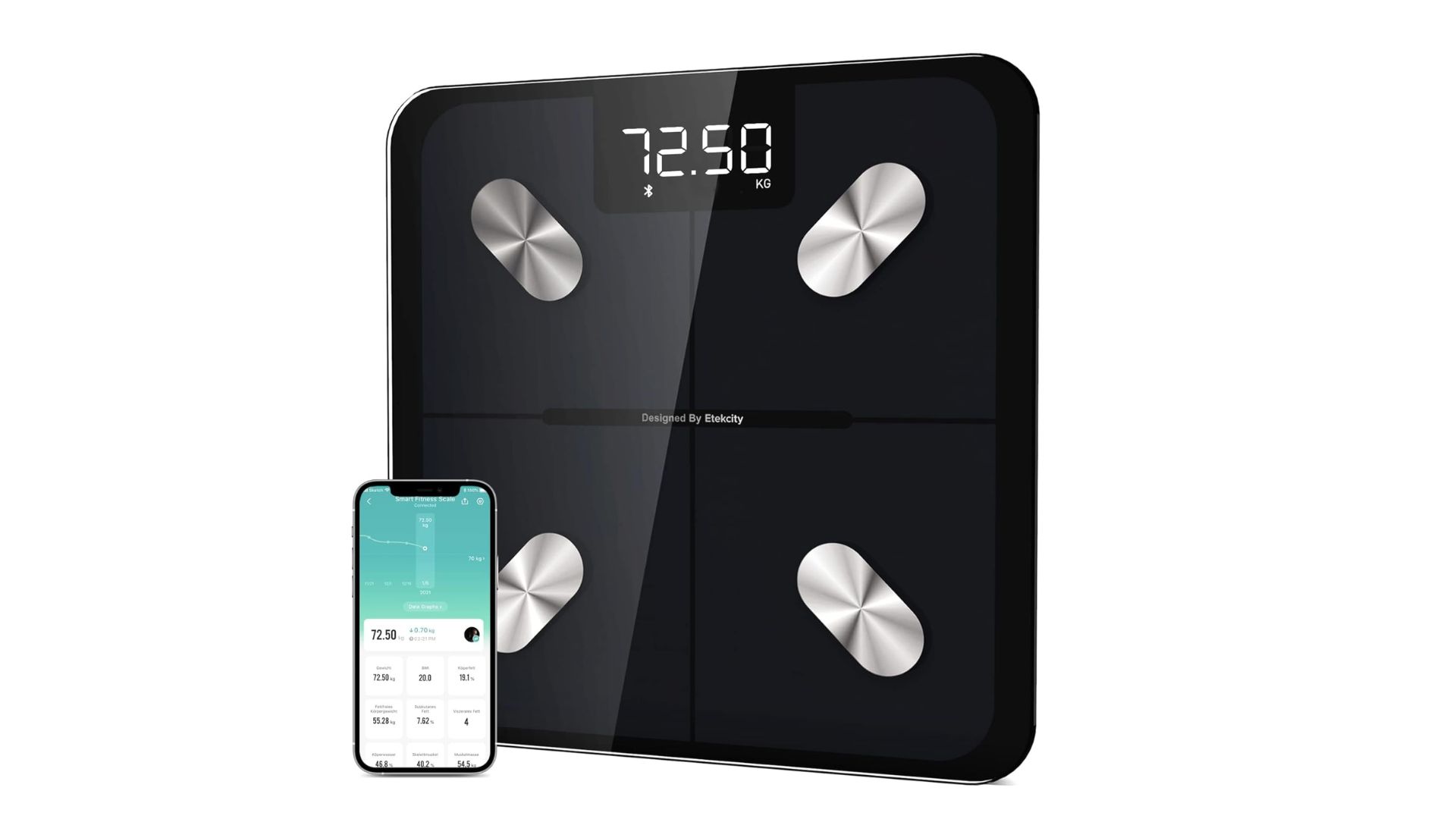
3. Etekcity Smart Fitness Scale ESF-551
Our expert review:
Specifications
Reasons to buy
Reasons to avoid
Is there anything the Etekcity Smart Fitness Scale ESF-551 can't do? From syncing with a variety of health and weight loss apps to offering detailed information immediately post-reading on the app, this was one of my favourite smart scales to test. And what's more, it's available for less than £30.
Etekcity has not scrimped on the amount of data that is available as once the scale is synced to the VeSync app. 13 biometrics are included: weight, body fat, BMI, subcutaneous fat, metabolic age, skeletal muscle, fat-free body weight, visceral fat, body water, bone mass, protein, BMR and muscle mass. These are presented on one page with any measurements of potential concern highlighted, which I found very useful and it's a feature not included on many of the other smart scales I tested. Click on the measurement, and it takes you to a page that reveals what the measurement refers to, how it can affect you, as well as dietary and exercise advice, which is super useful as context. As I love detailed graphs and data with explanations, this was a dream. we
You can also access the information as graphs to see any trending patterns, set goals, use the baby and pet modes (to weigh either while holding them), and sync with third-party apps, such as Apple Health (particularly useful if you've got the newest Apple Watch or the Apple Watch Series 9), Fitbit and MyFitnessPal. This makes the scale a good choice for anyone who's recently bought the newest Fitbit or is looking to lose weight sustainably and healthily via a calorie deficit.
If there are any niggles, they do not feel as sturdy as other scales, and you might prefer a more detailed breakdown of body composition - but as an all-rounder and an impressive offering given the price. If I had to choose between these and the Renpho scales, which are similarly priced, these would be my preference, taking into account the design of the scales and app alongside the available data.
Comparatively speaking, these scales are smaller than some of the competitors so it's worth checking your shoe size against the dimensions before buying, but it's slimline with four diagonal sensors and a bright, crisp LED display that's easy to view.
Best budget-friendly smart scale
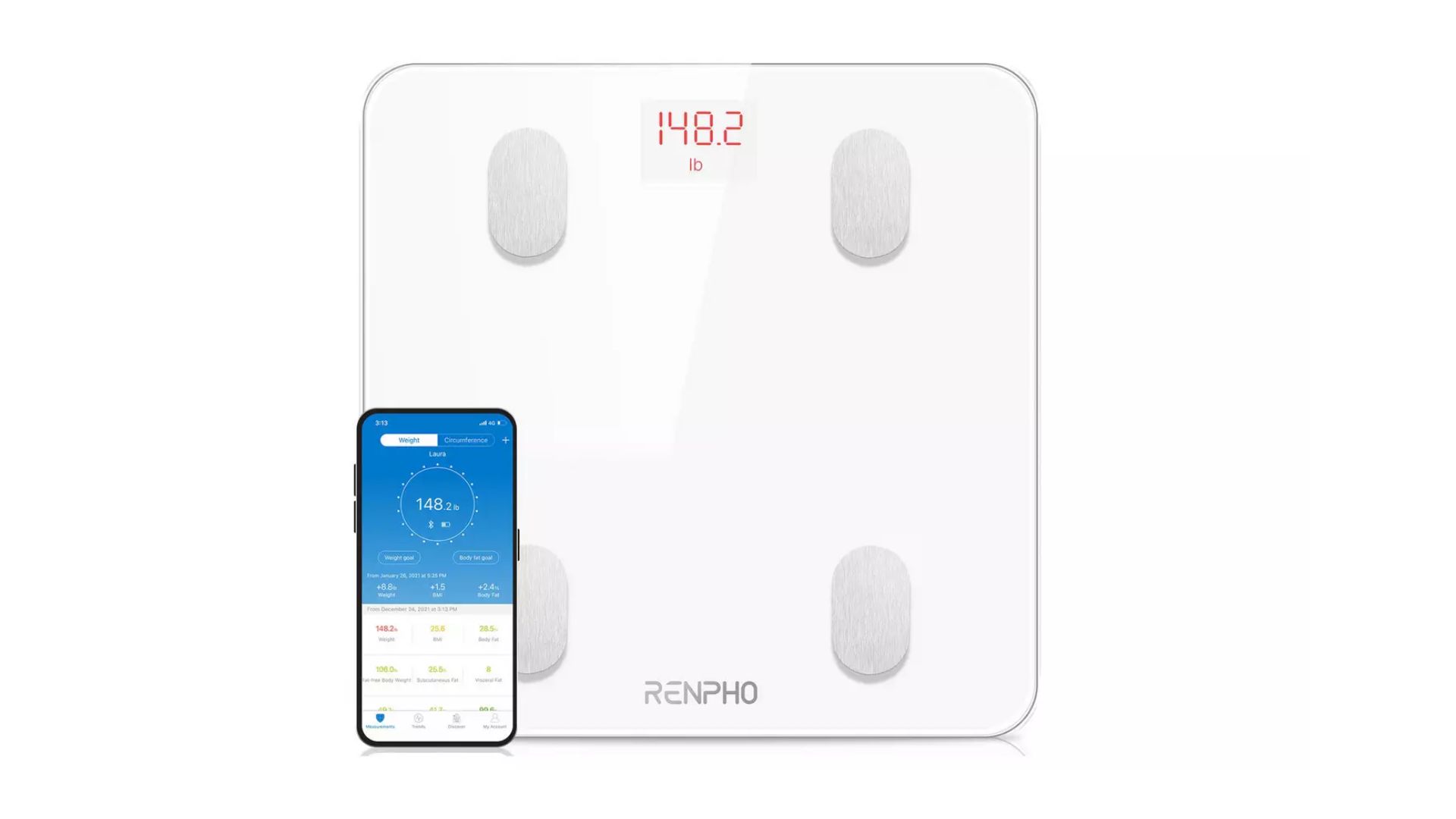
4. Renpho Elis 1 Smart Body Scale
Our expert review:
Specifications
Reasons to buy
Reasons to avoid
Cheap, small, and easy to set up, if you want smart scales that don't stretch your pocket or take up too much space in your bathroom, I'd suggest the Renpho Elis 1 Smart Body Scale.
These smart scales are the smallest of all the ones I tried, which is saying something as my size 7 feet filled the entire length. Any bigger and you would be hanging off the edge. The design is well thought out though with curved edges and a clear display screen that lights up in red. Weighing just over 1kg, it's very lightweight and easy to move around.
Although the scales come in at less than £30, they offer a plethora of measurements, which I found to be very impressive. Weight, BMI, body fat, fat-free body weight, subcutaneous fat, visceral fat, body water, skeletal muscle, muscle mass, bone mass, protein, basal metabolic rate, and metabolic age are all on the list. Like the Vitafit Smart Body Fat Scale, the metrics are colour-coded, so you can see whether they are higher or lower than standard baselines. When you press on each, you’ll see where the measurement sits on a scale. There is also a measurement report that compares your measurements against a baseline so you can spot areas to improve. It's very standard, so if you work out at the gym a lot and have more muscle mass, you may find that incorrect markers are flagged around BMI, for instance, since muscle weighs more than fat.
In my view, these smart scales are ideal if you are not looking to spend serious pounds on fancy graphics. There are plenty of measurements that can provide an overall guide to your health, and when I compared the Renpho Elis 1 Smart Body Scale to the other scales, the data fluctuated as much as any of them did (none of them came out with the same results), so more money doesn't necessarily equal more accuracy. Just approach with caution if your feet are size 8 or over - and be sure to check out the Etekcity Smart Fitness Scale ESF-551 before making a final decision as the two are fairly similar.
Most advanced smart scale
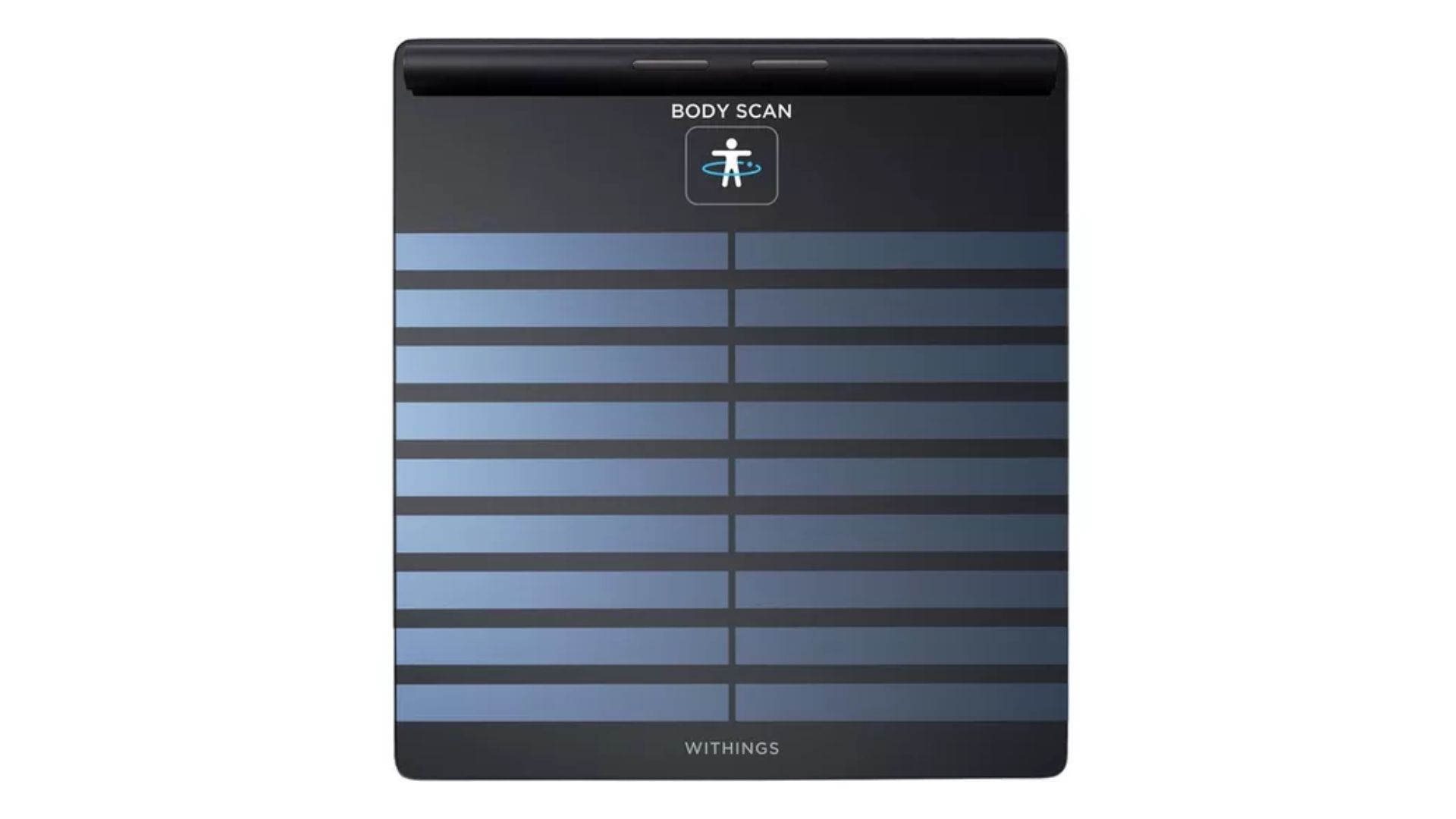
5. Withings Body Scan
Our expert review:
Specifications
Reasons to buy
Reasons to avoid
Billed by Withings as ‘a powerful clinical experience at home,’ this was the priciest smart scale I tried, so the expectations were high stepping on. First of all, it should be noted it's a good size, though heavy (at over 4kg) and not the easiest to manoeuvre. But it was straightforward to set up and it synced easily with the app. Although eight people can use these scales, it automatically recognises you when you step on the platform - rather than having to find your profile before you can get a reading like the Salter Smart Bluetooth Scale.
One big difference between the Withings Body Scan and the other smart scales I tested was the extendable handle, which pulls up from the machine's base and has more sensors. The handle allows for segmental body composition as the current is flowing through the entire body, as opposed to just the lower body, which means information on muscle and fat mass is broken down into arms, legs and torso. Per the experts (noted below), this is likely to be more accurate than devices just reading from the feet. The handle also contains electrodes required for the electrocardiogram, which tracks your vascular health and can highlight any anomalies.
The scan itself takes 90 seconds and vibrates after taking each reading, which includes weight, vascular age and nerve health. Each metric popped up on the scale's display, so I knew instantly what the result was and whether this was considered to be within a 'healthy' range. There is further explanation on the app, including graphs to demonstrate what headway you are making, or not, and a mock-up of your body to demonstrate fat and muscle composition.
The app itself is free, but there are additional paid-for features - like the health improvement score, recipes and guided workouts - at £9.99 a month. There's no denying that the depth of detailed data is impressive, but the hefty price tag needs careful consideration. I think unless your budget comfortably extends to this amount, it's worth looking at other smart scales on the market that provide similar depths of data minus the dent in your pocket.
Best smart scale for simple readings
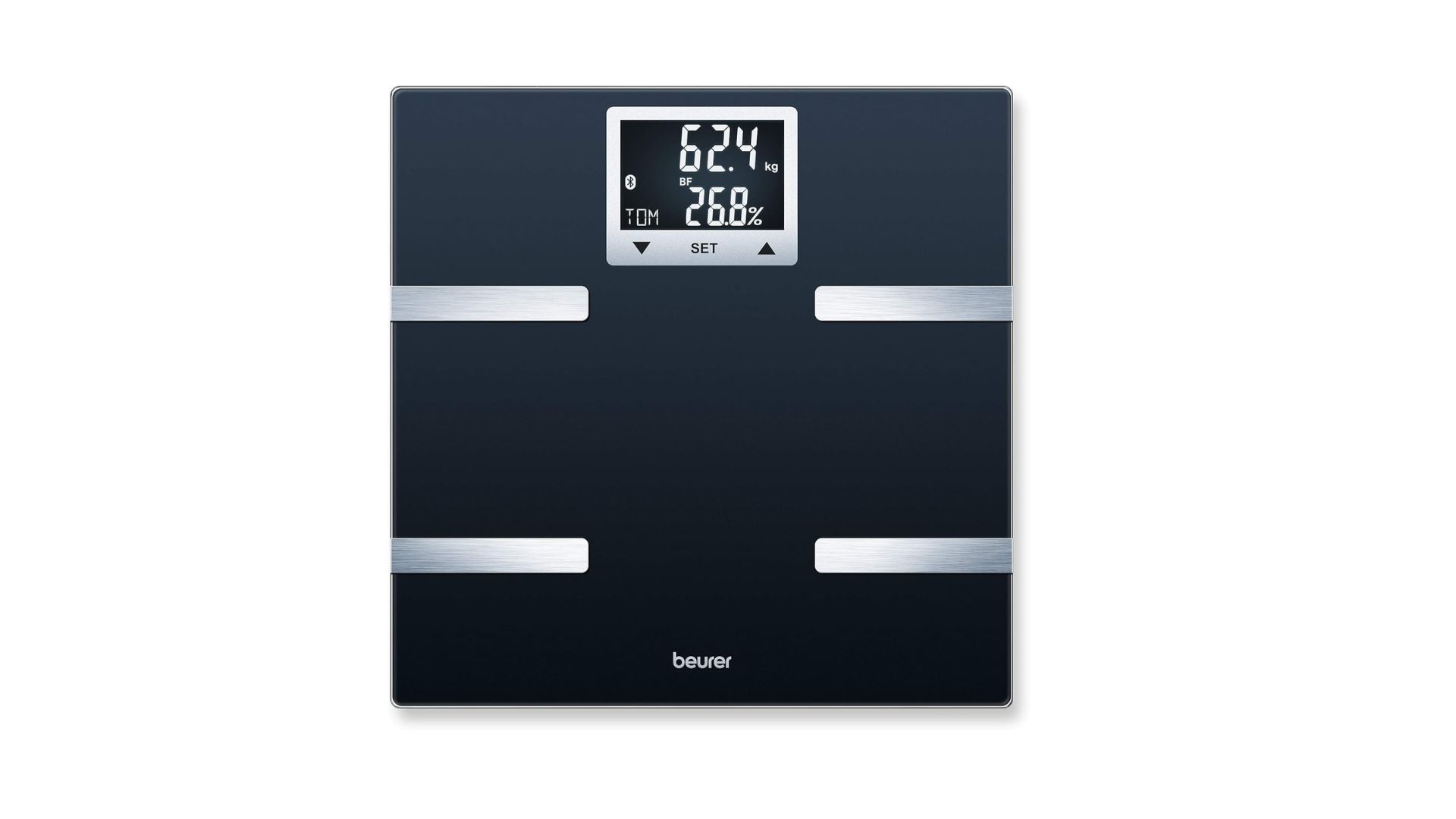
6. Beurer BF 720 Diagnostic Bathroom Scale
Our expert review:
Specifications
Reasons to buy
Reasons to avoid
Starting with the look of these Beurer scales - it's a good-size machine and slimline, making it easy to store in the bathroom. It also feels solid to stand on and grips well even on a tile floor. The setup was uncomplicated, which is always a big bonus with smart scales as it's not always the case, with basic instructions included in the box. I found the app easy to navigate as well, so I was off to a flying start in testing.
Much like other devices on the list, the Beurer offers biometrics for up to eight users and includes weight, BMI, body fat, body water content, muscle percentage, bone mass, and basal and active metabolic rate. You’ll find your weight on the app home page, next to a breakdown of your results. The BMI, body fat, water and muscle measurements are presented as coloured circles (blue, green, yellow or red depending on how satisfactory the results are), which means you can quickly determine how well you are doing on your health journey.
If you click on a circle, you are taken to another page that displays where your number sits within the different categories - but that is about it. I would have liked to have seen more detailed information and my results in context, as you can see with the Eufy Smart Scale P3.
Also from the app home page, you can add personal goals, track your history and access recipes, a tip of the day, helpful activities and explanations of common terms for no extra cost within the Beurer MyHeart section, which is a welcome addition on par with the Fitbit Premium app that pairs with the Fitbit Aria Air Smart Bathroom Scales.
The Beurer BF 720 Diagnostic Bathroom Scale covers the basics well, and the fact the app is minimal in design will be a welcome feature for some users. It's a good pick for those who already have comprehensive health knowledge and an understanding of what the individual metrics mean, so just want to check in for anomalies over time. For the price, I'd argue that our top pick overall - the Eufy Smart Scale P3 is a better option - but should you be looking for an alternative, this would be my go-to.
Best Garmin smart scale
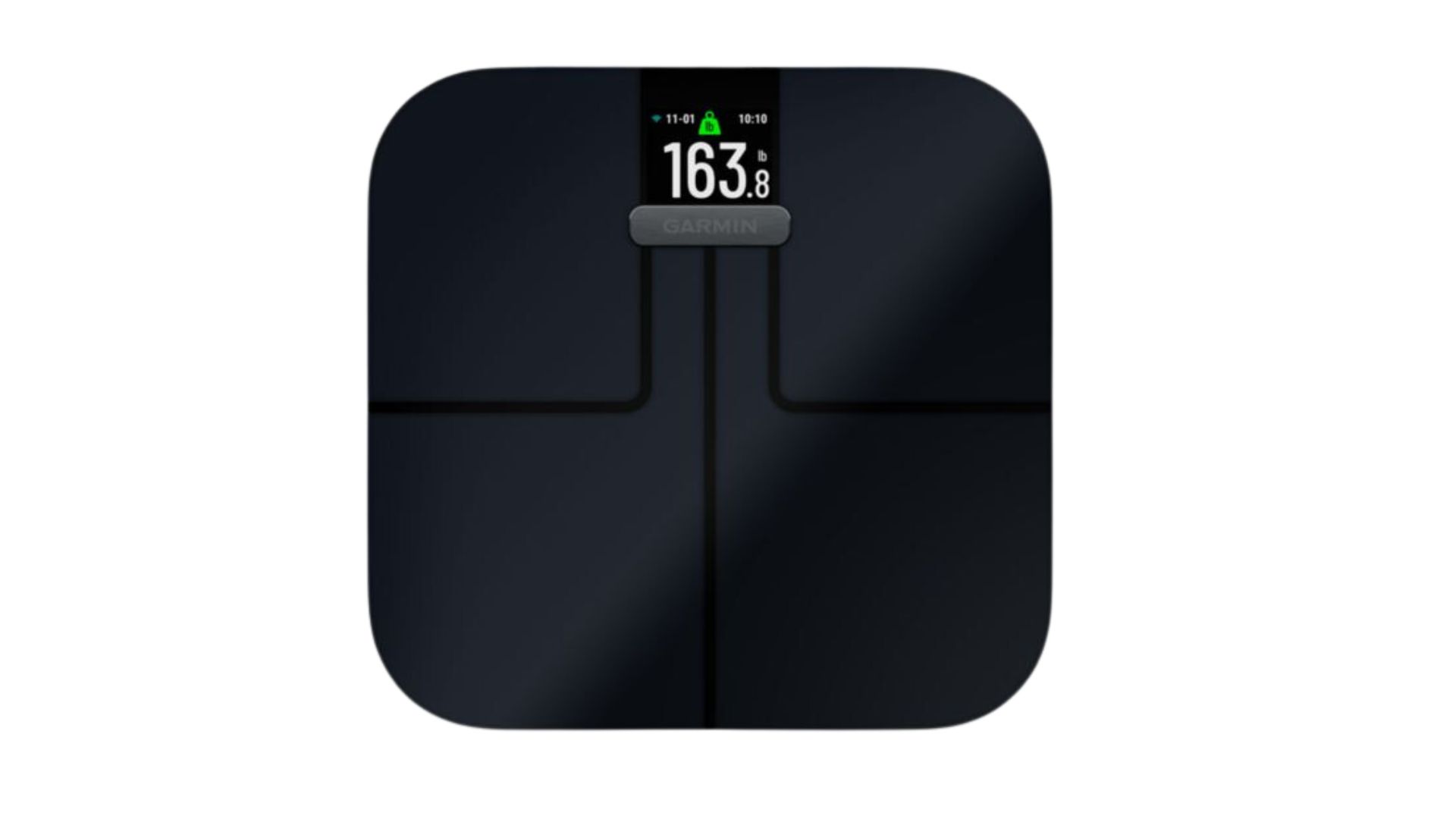
7. Garmin Index 2 Smart Scale
Our expert review:
Specifications
Reasons to buy
Reasons to avoid
Given that Garmin produce some excellent fitness trackers - like the Garmin Vivoactive 5 and the Garmin Venu 3 - it should be no surprise that a Garmin smart scale has made the list. The Garmin Index 2 Smart Scale is sleek and stylish, fitting discreetly into my bathroom, and very easy to move around at just 2kg. The display is clear and bright so you can view it even in dim bathroom lighting.
Naturally, this will be the pick of the best for anyone who regularly uses a Garmin fitness tracker as it's the same app for both watches and this smart scale, meaning you can have all your data in one place.
Aside from the dashboard, where you will find the basic health and weight measurements, you can track blood pressure (by taking a reading or adding manually), find out whether you are drinking enough liquid (by adding manually), and sync calories burned when wearing a Garmin device. Obviously, if you don't wear a Garmin fitness tracker (like me), you do not benefit from this and it could be reason enough not to invest in these smart scales. If you have a Fitbit instead, the Fitbit Aria Air Smart Scale may be a better choice.
The data includes weight, BMI, body fat, skeletal muscle mass, bone mass and body water. Multiple measurements are tracked on graphs, offering deep personal insight into these metrics - but there is no context as to whether the measurements are high, low, unhealthy or healthy. Perhaps this hasn't been included because what 'healthy' means is very much down to individual perception - and the baselines are readily accessible on the NHS website for most health markers (like BMI, for instance). However, given that Garmin is a real expert in improving health and fitness, this was a little disappointing. For those who have a good understanding of what these metrics mean or are prepared to learn by other means, it's not an issue.
Also, whether you see this as a negative or positive depends on how simplistic you want your information to be. Personally, I prefer to receive readings within context and alongside an explanation, giving me a full picture of how I'm doing. It's why the Eufy Smart Scale P3 made my pick of the best.
Best smart scale for families
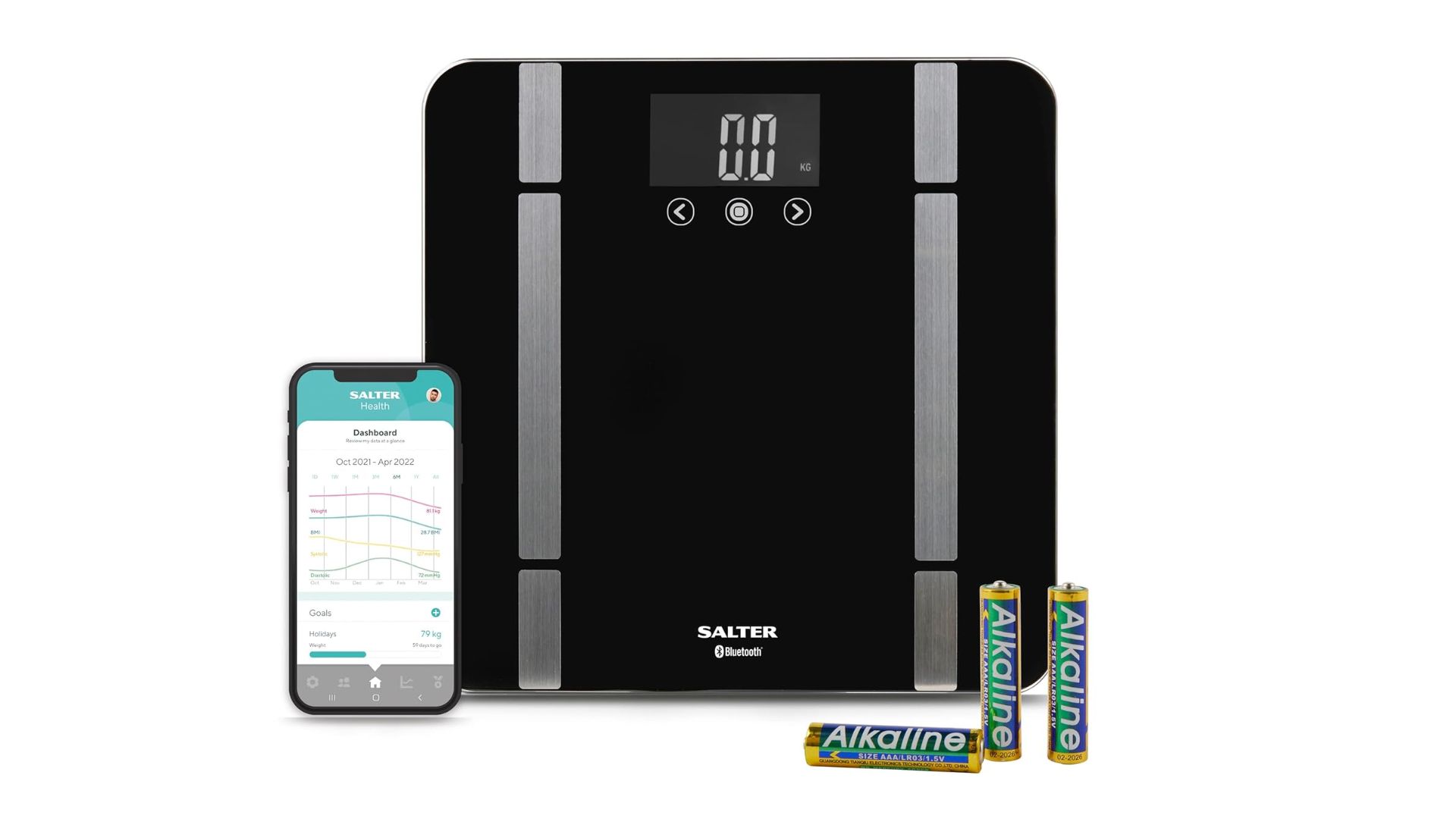
8. Salter Smart Bluetooth Scale
Our expert review:
Specifications
Reasons to buy
Reasons to avoid
The smart scales by Salter are a good size, large enough to fit my size 7 feet comfortably without being too heavy to move between rooms if needed. There is also a large LCD providing clear visibility.
It is possible to have eight people accessing the smart scales, which provides an opportunity for group challenges, so you could introduce a competitive element with your partner or other family members - if you so wish. My main quibble is that these scales seemed a little fussier to set up and turn on than the others as you have to access your allotted number before you can sync your measurements, which felt a little fiddly.
As far as biometrics go, these scales measure weight, body fat, body water, muscle mass, bone mass, body mass index, and basal metabolic rate. They are all presented simplistically with lists on the home dashboard and via rudimentary trending graphs. Although it was presented clearly, the way the data was displayed was just a little too minimalistic for me and I found it lacked context. I preferred further explanation as to what the measurements meant and advice on how I can improve my metrics, as shown on the Eufy Smart Scale P3, but it would be ideal if you just want the basic numbers and don’t want to feel bombarded by statistics.
Best smart scale for Fitbit users
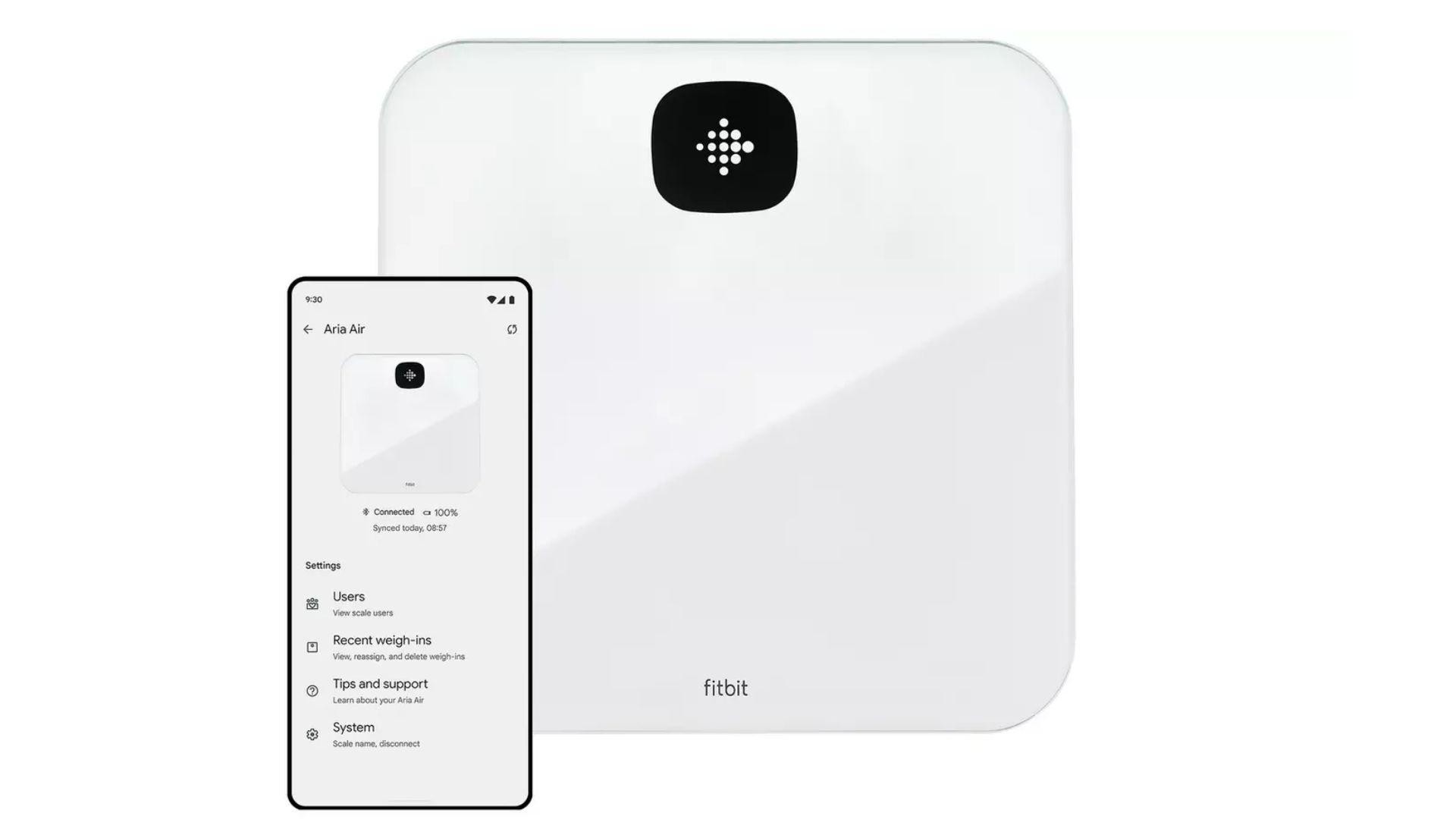
9. Fitbit Aria Air
Our expert review:
Specifications
Reasons to buy
Reasons to avoid
First things first, this is the least advanced smart scale on the list. While it compares excellently with Fitbit devices, making it a simple go-to for anyone with one of the best Fitbits on their wrist, it only records basic weight and BMI. For more detailed insights, such as the Eufy Smart Scale P3, Vitafit Smart Body Fat Scale, or Beurer BF 720 Diagnostic Bathroom Scale, you'll have to look elsewhere. At a fractionally lower price point is the Vitafit Smart Body Fat Scale, which I'd recommend instead if you don't have a Fitbit or you're looking for more detailed information from your smart scale.
The Fitbit Aria Air is slimline, ideal if you want smart scales that are not too obtrusive in your bathroom. They feel sturdy without being cumbersome, are simplistically but stylishly designed and with an adequately sized digital display. Given the brand's reputation, this wasn't a surprise to me - I've always been a fan of Fitbit design.
I have to admit I was surprised to discover that, unlike most smart scales, these focus solely on your weight. Bar your BMI, there is no breakdown of body composition or detailed analysis. It means essentially these are digital scales that sync to the Fitbit app as opposed to smart scales in the more conventional sense. The smart scales have no doubt been designed as an accompanying device to one of the many Fitbit types (one of which I wear regularly). If you don't have a Fitbit, you can use the scales and download the app for insights but there are better options in this case, as noted.
I found set-up easy and once I stepped on the scales, my weight was clocked immediately on the app. The benefit of using these scales is that it saves you from weighing yourself on a different device and then manually inputting the measurement into your Fitbit app and it's quick and efficient at what it does. It is up to you to decide whether the weight-only metric warrants the price tag, though - and if you are looking for a scale that links with a fitness track, weigh up Garmin vs Fitbit before making a decision.
How accurate are smart scales?
It's important to acknowledge two notable points about using smart scales at home. "While they can be a useful way to monitor key weight and health data, the data provided by smart scales will typically not be as accurate as more specialised methods and equipment used by experienced medical professionals in a controlled clinic setting who are also factoring in your other personal health history and metrics," says Dr Glazebrook, who works at The Slimming Clinic.
Take how hydration levels might be measured, for example. "If your scales just have a foot plate the body composition and hydration levels are only measured through the lower half of your body. An estimated value for the whole body is produced but smart scales with additional handles can provide better accuracy as the lower and upper body are measured directly. However, these scales tend to be more expensive and less user-friendly. I suggest patients take the values as ‘estimates’ rather than exact," she adds.
"Also, constant access to health data like this can, for some people, cause obsessive-like behaviours, and can also result in anxieties about their health which can do more harm than good."
I found there were very small discrepancies between some of the measurements. However, the same fluctuations were reflected on each of the smart scales and though there might have been a pound difference in weight, for example, the same overarching messages were concluded by all of them as to whether my measurements were too high, low or within the correct category to be considered healthy.
Dr Jane Glazebrook is a general practitioner, weight loss specialist, and clinical team leader and consulting doctor at The Slimming Clinic. She is also a certified personal trainer.
How I tested
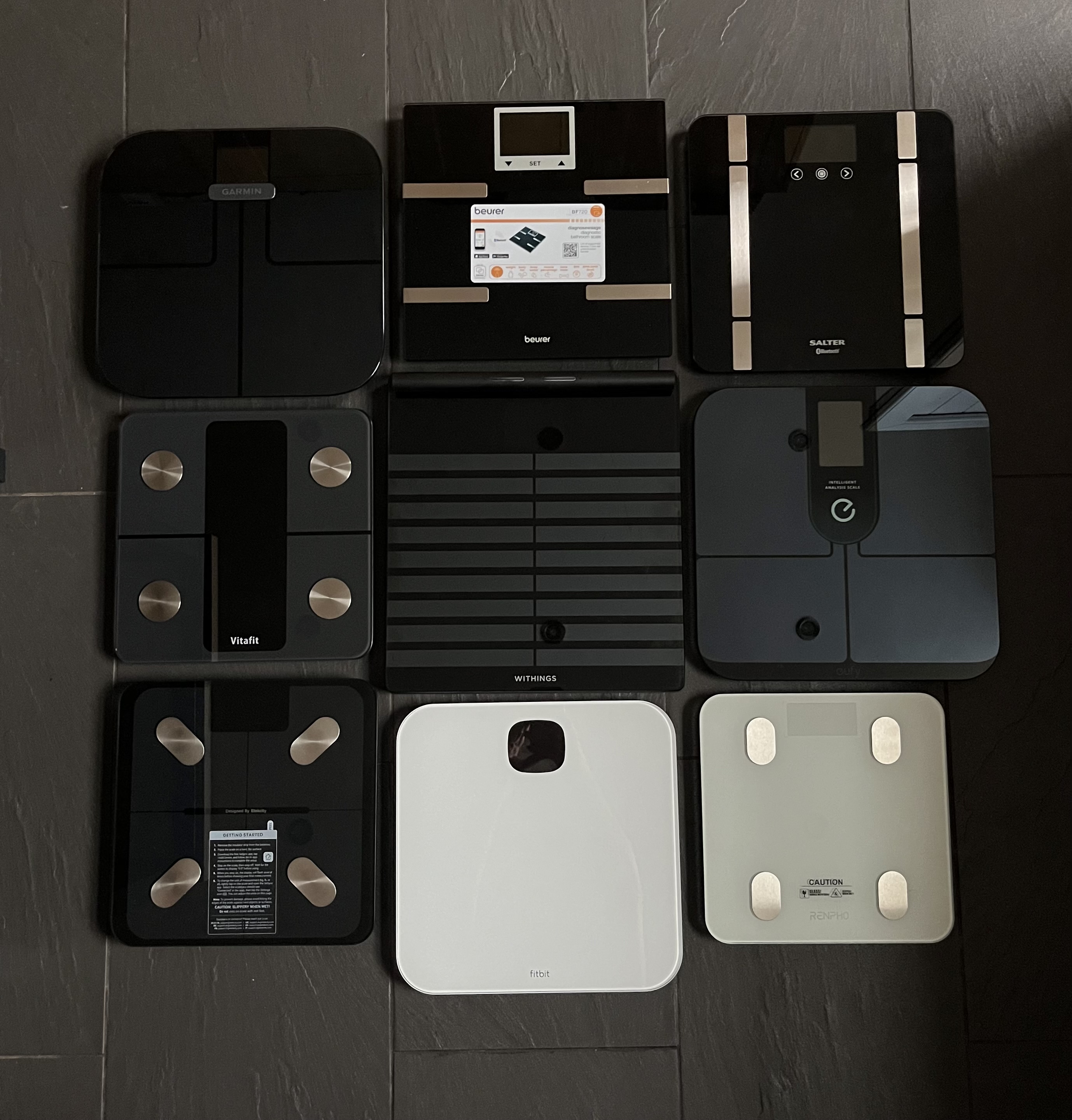
Susan Griffin tested smart scales for several weeks from brands including Garmin, Eufy, Fitbit, Salter, and more.
For this list, I tried and tested each of the smart scales a minimum of seven times over a 5-week period, which included a two-week holiday - helpful for two reasons. I could note and assess any differences in data and whether my body composition had changed significantly during this time, through different routines and activities, and I could see how easy it was to use the smart scales after an extended break.
I tried nine smart scales from brands including Fitbit, Garmin, Salter, Withings and Eufy, reviewing them on portability, convenience, data configuration, accessibility and price. All the accompanying apps were free to download.
I was barefoot, and for consistency, only wore my underwear each time. A hard surface is preferable to carpet, so I weighed myself on the same section of bathroom tile. Given there were nine different smart scales to trial, I kept them in an adjoining room and moved them onto the bathroom floor one by one, which helped me to assess portability.
In testing, I looked at the following details:
- Size and style: Within each review, I have included my first impressions of each smart scale, not only how it looks, but how it feels and the size. Given that not everyone has the same size bathroom, this is an important factor as the scale needs to be accessible without getting in the way.
- Portability: In case you cannot or do not want to have your smart scales on display all the time, I noted the portability of each smart scale. For example, were they lightweight or heavy to move? Would you need much storage space? However, it's important to read the instructions on your device as movement can affect the calibration of some scales.
- Ease of use: Any technology can feel overwhelming, especially at first, so I considered various factors, such as how easy it was to set up the smart scales, whether the instructions were easy to follow, and the simplicity of using them moving forward.
- Accessibility to data: The apps are key to smart scales, so I have included information on how easy I found it to access the data, how detailed it was, and how it is presented on the scale and in the app. The data is the most important part of using a smart scale, after all.
- RRP: As with any product, especially within the tech sphere, prices can vary a lot, so I included a variety of price points.
How to choose the right smart scales for you
- Buy from a reputable source: “I would advise people to buy them from a reputable and reliable source. This will help to ensure that they are accurate and reliable. Looking at genuine online reviews can also help to provide greater insight into their functionality and accuracy,” says Dr Glazebrook.
- Check suitability: “It’s not advisable to use smart scales when pregnant because of the electrical current that runs through them. For this reason, they also should also not be used by people with pacemakers or other medical devices,” says Dr Glazebrook. Check whether there is a weight-only option as this does not use the electrical current if you are looking to buy one.
- Consider your requirements: “When upgrading to smart scales, look for features that align with your health goals and preferences,” says personal trainer Jade Imani. Also, check the size and weight of the smart scales to ensure they meet your physical requirements.
- Do your research on data: “Pay attention to the ease of syncing with apps and data storage policies. While detailed metrics can be helpful, they can also be overwhelming if you’re not sure how to interpret them. Focus on scales that provide clear, actionable insights and choose features that will genuinely benefit your fitness journey,” says Imani, who works with Insure4Sport.
Jade Imani is a London-based, qualified personal trainer with a BSc in Sports and Exercise Science. Her specialisms include women’s health, biomechanics and she is also a running coach.
When is the best time to use smart scales?
The best time to use smart scales is consistently at the same time of day and under similar conditions to ensure the most accurate and comparable readings, says Imani. “In the morning, before eating or drinking, is typically the most reliable time to use any kind of weighing scale [as you're yet to eat or drink]. It’s also important to use them on a hard, flat surface for consistent results," she says.
It's also a good idea to wear minimal clothing - or none at all - when using the weighing scale as even the best technology can't tell the difference between body weight and clothing. However, if you do wear some clothing on the scale, be sure to keep this consistent with every measurement.
Are smart scales worth it?
eYes, after testing these devices for several weeks, I'm confident in saying that a smart scale is a worthy buy - provided you stay in your budget. It's not worth splashing cash you don't have on one of these devices.
It was fascinating to receive a detailed breakdown of my body composition, rather than just my weight and I'm keen to continue using smart scales, consigning my digital scales to the back cupboard, but I only intend to only use them twice a week, at most, and as a general guide to my health moving forward rather than gospel.
“Using smart scales at home offers convenience and allows for regular monitoring, which can be beneficial for staying on track with personal goals. However, scales used in a gym setting or under professional supervision can provide additional context and interpretation of the data," says Imani. "The best approach might combine home monitoring with periodic check-ins with a professional. Stay focused on your personal goals and use smart scales as a supportive tool rather than the sole measure of your progress."
Sign up for the woman&home newsletter
Sign up to our free daily email for the latest royal and entertainment news, interesting opinion, expert advice on styling and beauty trends, and no-nonsense guides to the health and wellness questions you want answered.
A journalist with two decades of experience, Susan interviewed A-list names in film and TV before going freelance and focusing on health, wellbeing, and lifestyle features. She has since spoken to world-renowned experts on the most innovative and effective ways to look after your mind and body; her work appearing in publications such as Daily Express, Daily Mirror, Metro, Fabulous and The Telegraph. When Susan isn’t working on her laptop, she is most content hiking in the Peak District or finding quiet camping spots to while away a weekend and knows first-hand the restorative benefits of being outdoors.
-
 We're in awe of Sienna Miller's easy-going and 'piece-y' hairstyle and how perfect it is for spring
We're in awe of Sienna Miller's easy-going and 'piece-y' hairstyle and how perfect it is for springThis laid-back hairstyle is - quite literally - making waves this season
By Naomi Jamieson
-
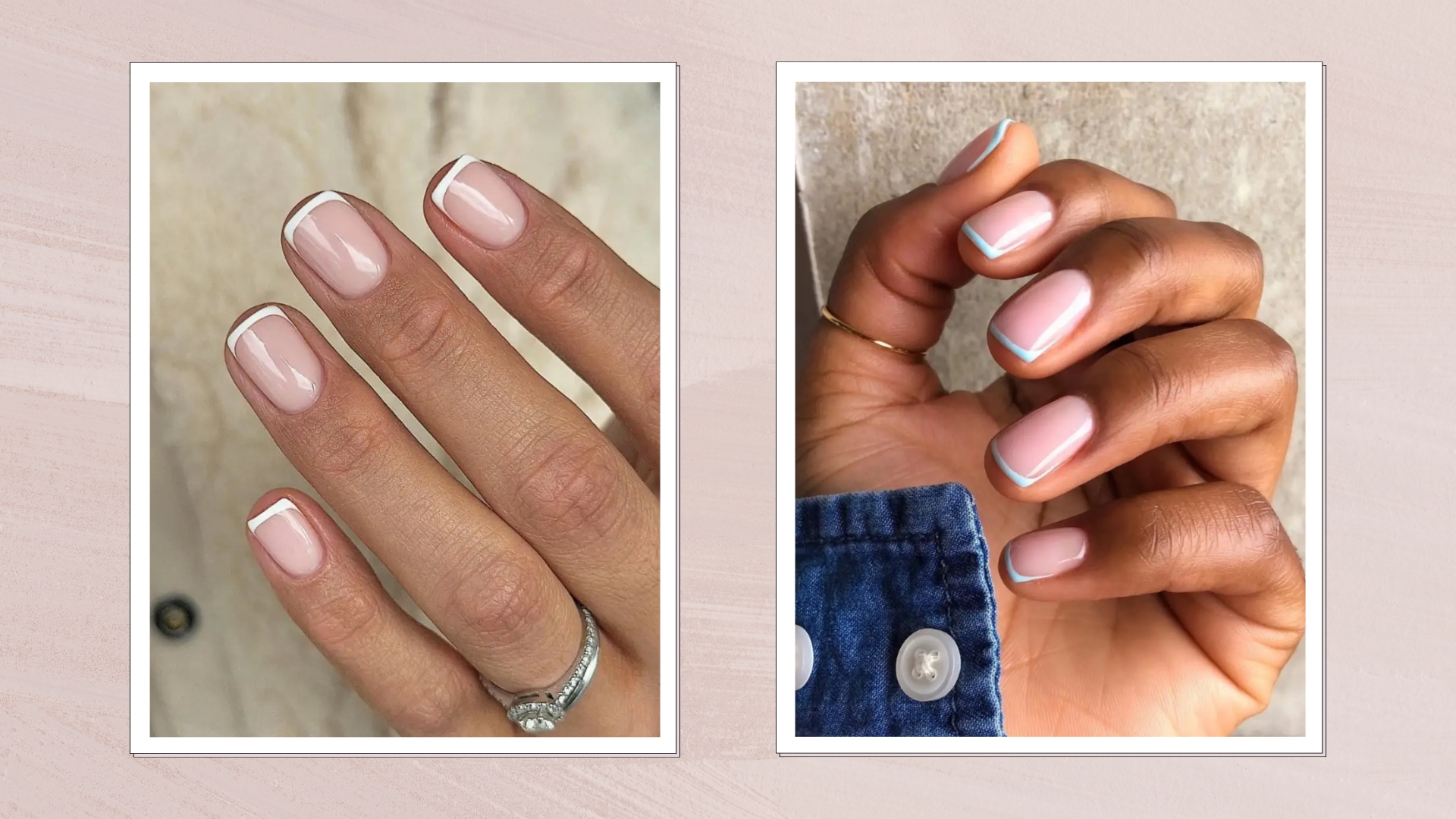 We never thought we'd see this 'dated' manicure make a chic comeback, but here it is - and we're on board
We never thought we'd see this 'dated' manicure make a chic comeback, but here it is - and we're on boardClean and angular, short square French tips are a go-to this season for a practical but stylish manicure...
By Naomi Jamieson